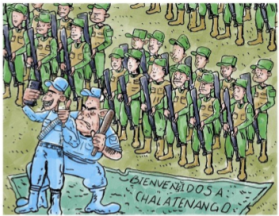Ex-President Saca and Six Former Functionaries Arrested for Embezzling $246 million
El Salvador’s Attorney General has accused former president of El Salvador Antonio Saca (2004-2009) of misappropriating as much as $246 million from a secret presidential account and diverting the funds into 14 different personal and business accounts. The ex-president and six other functionaries from his administration face charges of embezzlement, criminal conspiracy, and money laundering; they are all currently being held in jail as the trial commences.
The case first surfaced when the Supreme Court’s Probity Section opened a civil case to investigate the misuse of funds by Elmer Charlaix, who served as the president’s personal secretary during Saca’s administration. During the first 10 months of Saca’s presidency, Charlaix received $15.8 million in deposits to his personal bank account from a presidential account frequently referred to as the “secret line item.”In his defense, Charlaix claimed the deposits were lawful, but that he could not disclose their purpose because they were made “in service of State intelligence activities, they are confidential and secret expenditures.”
But according to Attorney General Douglas Meléndez, the deposited funds were actually distributed among other public functionaries, businessmen, the ARENA party, and ex-President Saca himself. In addition to Charlaix and Saca, five others have been arrested and charged in the case: Julio Rank, who served as Saca’s Secretary of Communications; César Funes, who ran the public water utility ANDA during the Saca administration; and three current employees in the Office of the Presidency who have worked in its administrative and financial areas since 1994.
Attorney General Meléndez charged that over the course of Saca’s term a total of $246 million was taken out of the “secret line item” presidential account, though he notes it is possible that some of this money was used appropriately. In 2010 the Supreme Court declared the presidential “secret line item” unconstitutional, but until then it had existed as a publically-funded account managed by the president’s office without any budgetary oversight by the legislature or transparency to the public, a presidential slush fund of sorts. The judge presiding over the case has ruled that Saca´s bank accounts and assets be frozen, and that he remain imprisoned while the case is tried.
Saca was the last of four consecutive presidents from the right-wing Nationalist Republican Alliance (ARENA) party, which governed for twenty years until the leftist Farabundo Martí National Liberation Front (FMLN) party won the presidential election in 2009. In the aftermath of the electoral defeat, El Salvador’s traditional oligarchy re-consolidated its leadership in ARENA, sidelining Saca and his supporters. A group of twelve ARENA legislators then defected and formed the Grand Alliance for National Unity (GANA), a new right wing party financed by Saca’s cousin and close advisor Herbert Saca. The exodus left ARENA substantially weakened for its first legislative period in opposition, and the party leadership expelled ex-president Saca, calling him a traitor.
The arrest and prosecution of Saca is one of several high-profile corruption cases being pursued by Attorney General Meléndez, who has received significant support and accolades from the US Embassy for his fight against corruption. Previously, social movement organizations have criticized Meléndez’s close relationship with the US government and accused him carrying out a political agenda against the FMLN. In a radio interview following Saca’s arrest, FMLN legislator Roger Blandino Nerio explained the sudden political will to go after a former right-wing president: “They are punishing those who left the ARENA party.”
Meanwhile, the broad-based Social Alliance for Governability and Justice (ASGOJU) expressed measured satisfaction with Saca’s arrest, but continued to question the Attorney General’s failure to investigate corruption accusations against ARENA’s current leadership, particularly those levied against Saca’s Vice-president and current ARENA legislator Ana Vilma de Escobar and against current Supreme Court magistrate and ARENA donor Belarmino Jaime. Given Meléndez’s failure to act on these cases, ASGOJU announced plans to request participation as a civilian complainant, a role that was instrumental in pushing forward the corruption case against former president Francisco Flores.
In a public communiqué, ASGOJU called on the population at large to, “Demand that the Attorney General’s Office and the judiciary act transparently and impartially. Prosecutorial and judicial action against corruption should be balanced, without political slants, and without the logic that in some cases actions are taken and in others only declarations [are made].”

 "I am a CISPES supporter because continuing to fight for social justice and a more people-centered country means continuing the dream and sacrifice of thousands of my fellow Salvadorans who died for that vision.” - Padre Carlos, New York City
"I am a CISPES supporter because continuing to fight for social justice and a more people-centered country means continuing the dream and sacrifice of thousands of my fellow Salvadorans who died for that vision.” - Padre Carlos, New York City

